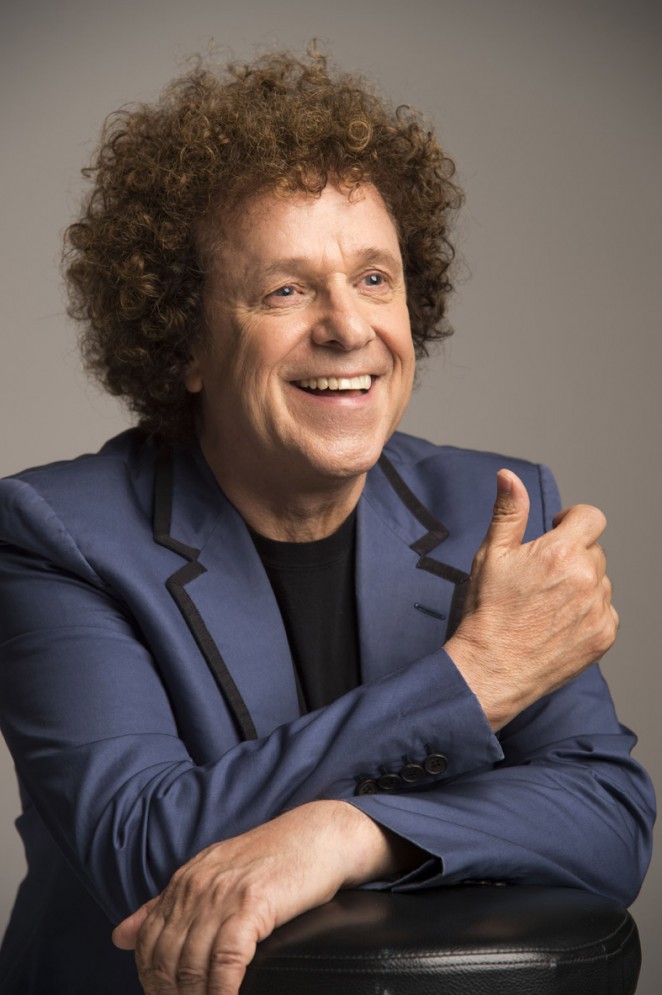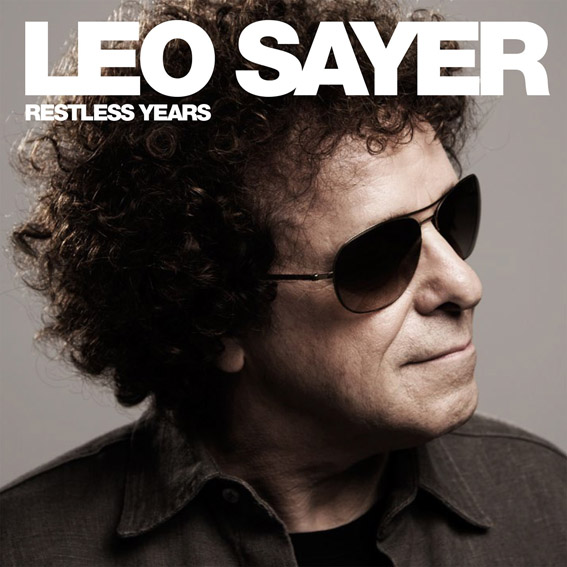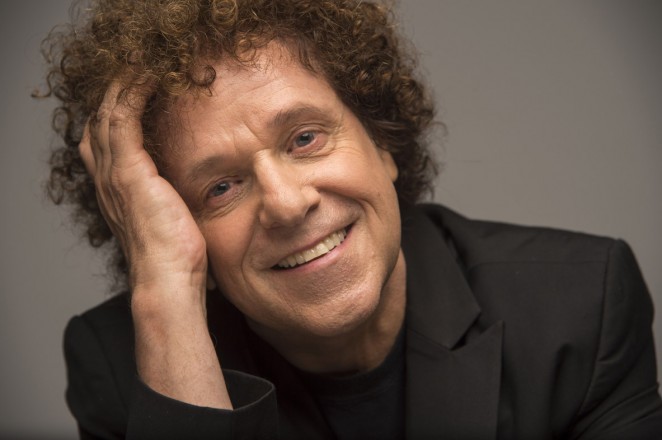With album sales of 80 million and a back catalogue brimming with worldwide hit singles (The Show Must Go On, One Man Band, Giving It All Away, When I Need You, More Than I Can Say, You Make Me Feel Like Dancing, Thunder in My Heart etc), you can’t dispute the fact that Leo Sayer is your bonafide pop music legend. So popular was he with Australian audiences back in the 70s, that for the Melbourne leg of his tour, he sold out seven nights in a row at Festival Hall. Seems the feeling was mutual, as Leo relocated to Australia in 2003 and officially became a citizen in 2009. Last month Leo released a new album Restless Years, an all-Australian production, recorded here and featuring some of our finest musicians. Sayer is currently on tour and took a moment out of his busy schedule to talk to Greg Phillips about the new album.
There are 13 tracks on the album. How many songs did you have available to choose from?
There are three which we haven’t even included on the album, which I guess they’re sitting around waiting to be bonus tracks. There will be a vinyl version and a bonus version at some time. I think I’ve been getting more prolific over the years with ideas for songs. A few things were paid forward, things I wrote with Albert Hammond from about ten years ago. One Green World comes from 1992 and one even comes from 1975. It’s a bit weird when you are a song writer. You can find that you’re hot with a new idea but something in your mind wants you to go back to an older idea, your radar is open to everything. That happens to me quite a lot. I find that I am thinking of a new idea but maybe I’d crossed that path before or If I hadn’t crossed that path before, while I’m going back through things, I’ll find something else.
What warrants the song Restless Years being the title track? Is song closer to your heart than others?
I thought it was pertinent because Restless Years was written about that moment when you’re trying to get on the train as it were. You’re on the way to a career and wondering how it is going to be? You are stretching your imagination to think what life is going to be laid out for you because you are making a commitment. That song is about making a commitment to a life. So it was written about the early days. You’re thinking, am I going to do this? Am I going to do that? Am I going to change my name? Am I going to be this kind of person? Will it succeed or will it fail? Will I be happy or unhappy? Will I be selling out or sticking to my ideals? Will it be my ideas or someone’s else’s ideas? So there are all these things going through your head.
 There’s a track called Radio Song, about the guy with all the music knowledge, it name drops a lot of songs ….
There’s a track called Radio Song, about the guy with all the music knowledge, it name drops a lot of songs ….
It name drops the titles of the songs. I experienced hanging around with a lot of radio DJs back in England. There was one I bumped into recently and I asked if he was still DJing. He said, well I don’t hear it anymore… I don’t feel it anymore. The thing with someone who lives for music, like a Glenn A. Baker here in this country, they talk and live in the songs. I always think of that line in the Dennis Potter story Pennies From Heaven, that became a film. The protagonist turns around and says, why can’t life be like in the songs? He’d gone with the romance of what the songs meant. He thought he could live life like that but the reality is that you can’t be walking on a star, but he thought life should be like that. So this guy in the song has his head in the clouds and he is obsessed with the songs and made his life around them. One day his boss says, sorry it’s over we don’t want all of that heart and love for music.
Many of your songs begin with a piano intro, you play piano but not on stage … why not?
No I am crap really. I fudge it and thank god for computers. I am dyslexic anyway and could never hold down the piano pedal as I was playing the notes. I can just about get through to write. On the demos you can hear my piano parts, which are close to the original but without the skill. I need Bill Risby and David Courtney and Russ Ballard and all those guys that I wrote with to pull that side out. But I do hear the piano parts in my head and I can dictate them with Logic Audio on the computer, so it is possible for me to do it for the demos and create something that is a recognisable template.
You used your old mate, producer Richard Lush to record the piano parts.
Absolutely. It is essential to have Richard there because 301 (Sydney studio) has an amazing piano but nobody records it like Richard. The other big important element of the album and sometimes I think I should make him co producer, is John Hudson. John really helps me create the last part of the album, the tone poem of the whole thing. The way it sounds and is voiced, the atmosphere and colours. One of the last things I do is add a little strings and sounds and more vocal bits. I do that myself at home… then John is my right hand man to make that all sit. He has mixed Orchard Road, More Than I Can Say, many things. He makes my samples sound like humans.
You’ve always had a lot of soul in your voice and that’s evident on this album too. I always loved the way your voice merged with brass … on your song Bells of St Marys for instance. It’s the same with One Green World on this new album. Who are some of your favourite soul singers that you learned from?
I used to go out with soul bands and sing with them. I used to love people like Joe Tex and Wilson Pickett, the rough and raw ones but I love all of the real artists as well. People like Al Green and Otis Redding … Aaron Neville as well, they have these amazing cultured voices. If they had of sung opera, they’d have been stars. Bobby Blue Bland is another favourite. So I grew up listening to those singers and loving everything that they did. Also the girls like Aretha Franklin and Martha Reeves and Gladys Knight, also all very important to me. I suppose those were the voices which were in my head. Yet I love the songwriting of people like Buddy Holly and Bob Dylan. I was always looking at how do you mould that kind of great powerful, soulful kind of voice with songs of deep meaning? You listen to Aaron Neville and he is singing very meaningful songs with that wonderful soulful voice, so I don’t think it is so unusual in what I do. You hear it in singers like Joe Cocker or Paul Rogers with Free. So those soulful voices can still impart something of great meaning and that is what I am always trying to do. I am kind of a folkish songwriter in a way but with a soul mentality.
Most of the iconic recording artists such as The Stones, Zeppelin, Floyd, Bowie etc had a golden period which gave us a cluster of classic albums. Bob Dylan said a few years ago that he could never repeat his golden period again because it was about a time and a place and where he was at at that time when the moons aligned. You have a song on this album which was written in 1975, Sometimes When Things Go Wrong, written during your your ‘golden period’ but it sits perfectly well with the newer songs. Do you think that nostalgia gets in the way of our appreciation of newer material from heritage acts?
I think it is different for me because often during my career I haven’t had the opportunities. I have been ripped off a couple of times. I have had frustrating situations where I have been ready to make an album, wanted to make an album and even known who I wanted to write with or produce with but haven’t been able to do them. I am carrying a lot of unfinished business forward. That’s where I differ but I do agree. With people like Bob Dylan, who was kind of given every opportunity in their heyday, you see them exercising it and pumping it to the hilt. One incredible album after another. One moment he does Nashville Skyline, the next thing is John Wesley Harding, then Blood on the Tracks, and each one of them brings classics with it and that always happens. My career is a bit strange, a bit topsy turvy because I’ve had so many glitches in it. I may have had a halcyon period between Silverbird and Another Year but after that it went into different directions. I can’t honestly say that when I was making Endless Flight, you know, Thunder in My Heart … although I was happy with the results … they weren’t really the core material for me of what I was originally setting out to do. There was a very different style coming in to it because it was infused by the ideas of my producer and later producers did the same thing. I would have really been happy to have produced myself right from the start. Of course when you don’t quite know what you are doing and there’s situations of finance involved, you don’t get those opportunities. Now I am as happy as Larry. I feel since Voice in My Head, I have actually started my career. Now I am producing myself and able to do what I want to do and sing the songs in the way I want and are played in the way I want … I am happier than I have ever been. My prime time is coming now, that’s what I feel.
 It’s a totally Australian production. How did you go about putting the local musicians together for the album?
It’s a totally Australian production. How did you go about putting the local musicians together for the album?
We have been very lucky. Just at the moment I am thinking, God I need to do a new album! I was booked to do the APIA Good Times tour and I found when doing it, that I had this great band behind me. I thought these guys have the ability to play the songs the way I like. I really wanted good players to interpret them, you know … virtuoso musicians to do it and here they were right in front of me … well right behind me anyway! Mitch Cairns on bass is just an amazing player, a great musical mind and of course a great producer. He’s done such a great job for Russell Morris with Sharkmouth and Van Diemen’s Land. Bill Risby has been working with me for some time and is an incredible musical brain, great musical director. So I’m thinking there are two good MDs there already and the band seemed to get on really well. Then there’s Danny Spencer, who is a monster guitarist and Johnny Salerno our drummer, is just outrageous. I was thinking maybe this is the tightest drummer I have heard since Jeff Porcaro. I love the way Sting always puts together these incredibly intelligent and talented bunch of musicians and I wanted to do that. Like Van Morrison how he used the Modern Jazz Quartet to record Astral Weeks. You try to choose people who have maximum ability and maybe even far more than what is called for. Dylan did it using all the Nashville guys who were amazing and not fazed by anything and that’s what I found I had in the studio with this band. It made it really easy and they understood where I was coming from but were able to add an incredible amount of talent and diversity to it. I think the album, as good as the concepts and ideas are … which is my side … the actual carrying out of it technically is so good. Then we also had characters like the Bull Sisters and Natasha Stuart who is probably one of the most underrated singers in Australia. We had a great horn section from Melbourne plus my dear friend Mark Kennedy came in to do percussion. It was fantastic!
For tour dates and more information visit: www.leosayer.com



